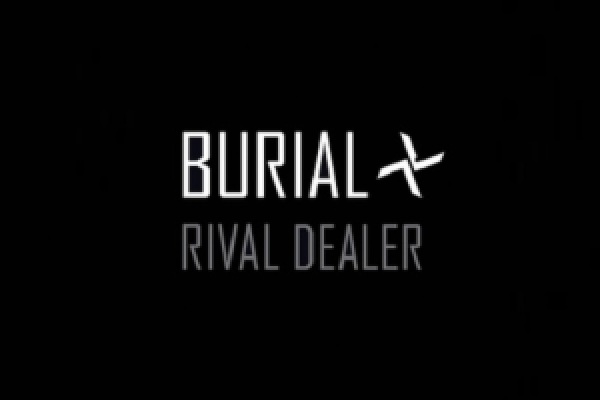Burial, the enigmatic and influential dubstep producer, is notorious for pioneering a haunting, darkly ambient, and fuzzy aesthetic that’s almost instantly recognizable. He released two critically acclaimed full length albums, Burial and Untrue, in 2006 and 2007. Since then, the term “Burial-like” is used to describe any kind of production involving rolling 2-step drum patterns, fuzzy sub bass, and down-pitched R&B vocal samples that are rendered sexually ambiguous.
Today, these sorts of sonic elements embody an all-encompassing electronic sub-genre known as future garage.
The best description of Burial’s sound comes from writer Derek Walmsley of The Wire who described the Burial sound as something “like cobwebs on forgotten instruments.”
“Distorted and heavy, yet also warm and earthy,” he said in a 2009 book, “they resemble the balmy gust of air that precedes an underground train.”
Burial’s unusual artistic craft is nearly as distinctive as his sound. He sparingly releases music in thoughtful quantas, in which songs, usually around 11-13 minutes long, contain a multitude of miniature melodies and breaks. Furthermore, he is fundamentally elusive; he doesn’t promote his releases, nor has he ever played a live set. For most listeners, the mystery only makes his music more attractive. His latest release, Rival Dealer, continues that mystique, and contains only three songs throughout its 28 minutes.
Overall, Rival Dealer is his most different work, at least atmospherically, to date. Here, Burial shifts his traditional sound by including more jagged and aggressive percussive styles while also introducing more uplifting song progressions and more developed, narrative samples. Though there are some points on the EP that seem unrealized, for an artist who has already perfected his sound, Rival Dealer is still a step forward. It pushes and develops the Burial discography by treading into fresher and more experimental soundscapes.
The EP begins with its title track, arguably the best of the three on the release. The song opens with his trademark urban static sounds: crackling, spray paint shaking, televised white noise and a wailing siren. The soundscape is then pierced by a soul-throbbing phantasmal sample.
“I’m going to love you more than anyone,” sings the voice. Interestingly, it is a sample taken from a webcam-recorded cover of a Gavin DeGraw song.
Though that recorded cover only has around 1,000 views, it is perfectly emblematic of the intimately personal and unrecognized emotions you feel when listening to Burial’s music; his sounds evoke an acute sense of isolation. Yet, because his work is both sorrowful and romantic, you’re inclined to feel overcome with an aura of wistfulness, like the feeling you gather while looking through vintage photographs of a deceased grandparent’s wedding.
Around the 7 minute mark, “River Dealer” concludes with a sense of tired awe, and ends with gradually uplifting and cinematic notes tied to a vocal sampling about stargazing. “You can see the city lights brighter than ever,” the voice says, foreshadowing an upcoming track. “The stars and constellations/I saw something come down to us.”
River Dealer‘s midway song, “Hiders,” is perhaps the most different and uplifting sounding Burial track to date. It begins with a piano ballad atop melancholy bass hums. And again, it features another vaguely romantic sample. “You are the sunrise/I will always protect you/you don’t have to be alone.” Halfway through, the song is struck by an 80s-sounding rapid fire of a drum machine, high hats, and snares–something which sounds almost misplaced in a Burial song.
This is a clear cut point in the record where Burial is trying outside his traditional production realm, but in this instance, the experimentation pays off. The pounding drum machine establishes a vigor that carries the second half to its finish.
The final song, “Come Down To Us,” is less of a song rather than a series of vocal samples and simple rhythms and progressions aimed at telling us a story. It starts with an exotic harp-like arpeggio that continues for the first half of the song alongside slow percussive half-notes. The subsequent vocals are cinematic in their progression and tell a mysterious story.
Using a variety of samples that were stitched together the narrator paints a picture of himself alone in a night landscape, where he encounters an extraterrestrial being. The singer declares, “I’m lost. Who are you? Why won’t you come to me?” Later in the song, we hear a different, but familiar sample; the same one that appeared at the beginning of Burial’s 2012 EP Kindred.
“Come Down To Us” is ultimately notable for its inventive use of vocal samples. But it is also the one instance on the EP where the musical components seem to be lacking or somehow incongruous with the song’s atmosphere. The second half the song takes a bizarre turn and uses magical-sounding synths along with autotuned vocals, and both sound misplaced. It all finally ends with a quote that features a transgendered person speaking about worlds unimaginable. Perhaps the message is a reference to his heavy use of androgynous vocal samples?
In total, Rival Dealer continues Burial’s streak of releasing impeccable EPs. At many times, in atypical fashion, Burial substitutes skip and swing rhythms for something more experimental and uplifting in tone. Besides a few moments which sound mawkishly sentimental, Rival Dealer is fresh, uplifting and exploratory in its soundscapes–which is commendable coming from an artist who’s famously perfected his sound.
Article by Michael Roe



Leave a Reply